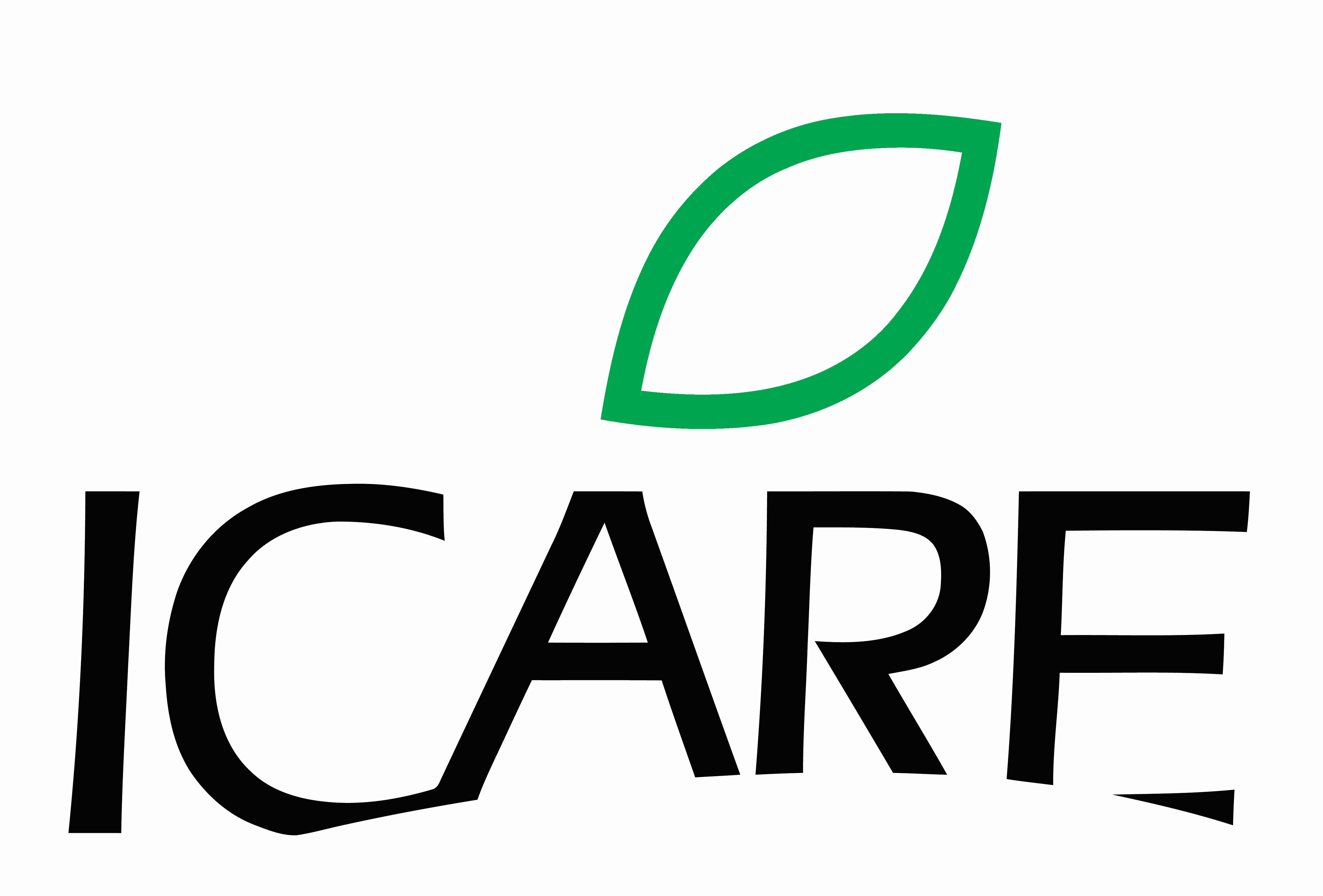ICARE Modernizes Agribusiness at New Campus.
The Armenian Mirror-Spectator’s reference about how ICARE modernizes agribusiness at its new Zabel Yessayan Agribusiness Center (ZYAC).
The article was written by Aram Arkun. https://mirrorspectator.com/2022/11/30/icare-modernizes-agribusiness-at-new-campus/
WATERTOWN — The International Center for Agribusiness Research and Education (ICARE) has been providing agribusiness and agriculture education since 2005 based in an office and classrooms on Teryan Street in downtown Yerevan belonging to the Armenian National Agrarian University (ANAU). Now, it is developing in Proshyan village in Kotayk Province a campus which recently was renamed the Zabel Yesayan Agribusiness Center (ZYAC).
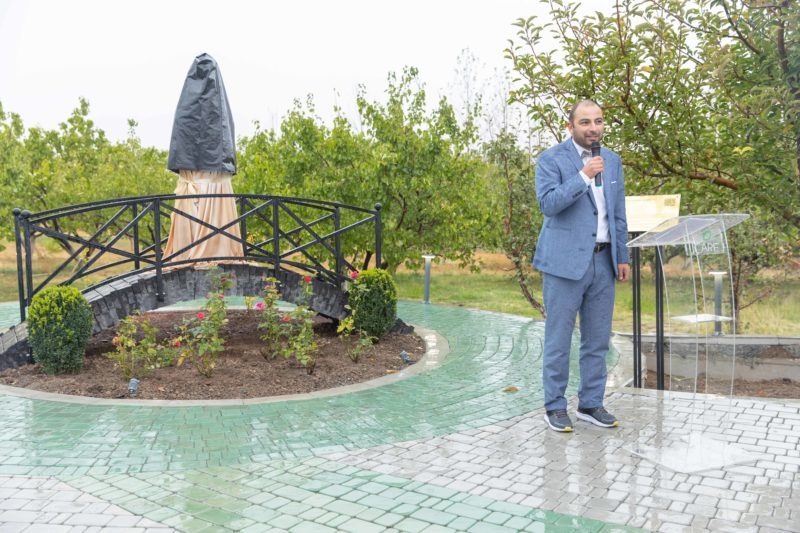
ICARE Foundation director Arthur Grigoryan explained that previously students would leave Yerevan for fieldtrips and internships but land was purchased in Proshyan in 2019 for a more hands-on learning experience, and more land was added from 2020 to 2022. The new area initially was called an ecofarm but was renamed ZYAC this October. Victor Zarougian and Judy Saryan, longtime major supporters of ICARE and its various subsidiaries, were major proponents of turning the ecofarm into a campus.
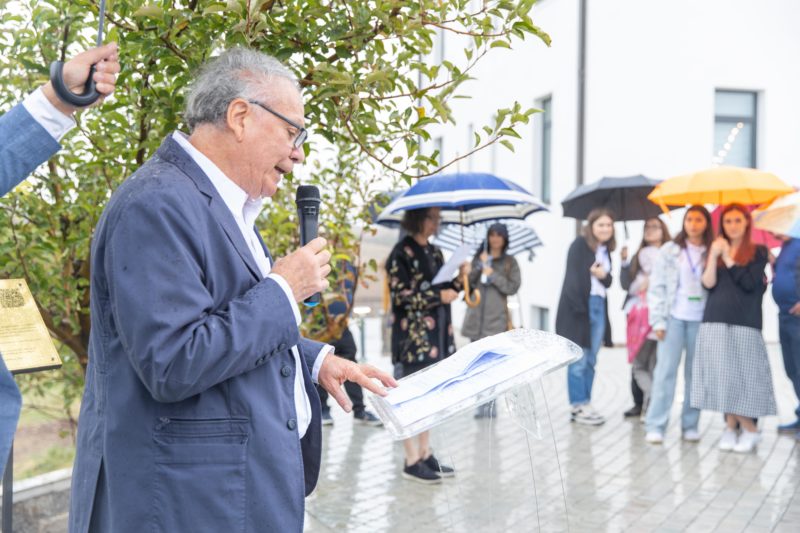
Saryan was involved with translation projects of the works of Zabel Yesayan through the Armenian International Women’s Association (AIWA). She said, “I am a big supporter or fan of Yesayan’s writing as well as her political activism and her focus on education. It seemed to me that her reason for coming to Armenia was really to be teaching at Yerevan State University. That fit well with the educational purpose and goals of ICARE. In addition, she was also very much a believer in the rural areas. You can’t ignore them; you can’t just focus on urban areas. Again, that seemed to fit with the goals of ICARE and their emphasis on agricultural education.”
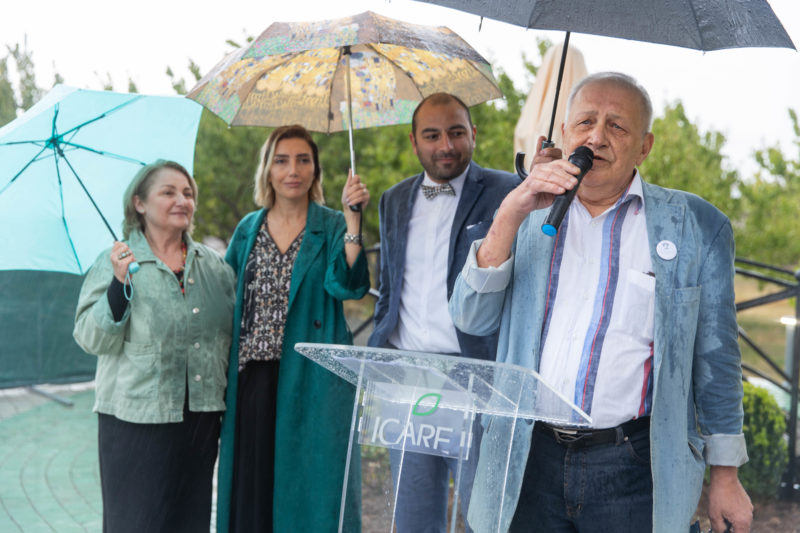
She added that she and her husband think that agriculture is vital for Armenia’s security and so it must be improved for the sake of food security and the stability of rural Armenia. As far as ICARE is concerned, she said, “We really believe in the people and the quality of education that they are giving is first rate. They are training people for jobs that actually exist in Armenia.”
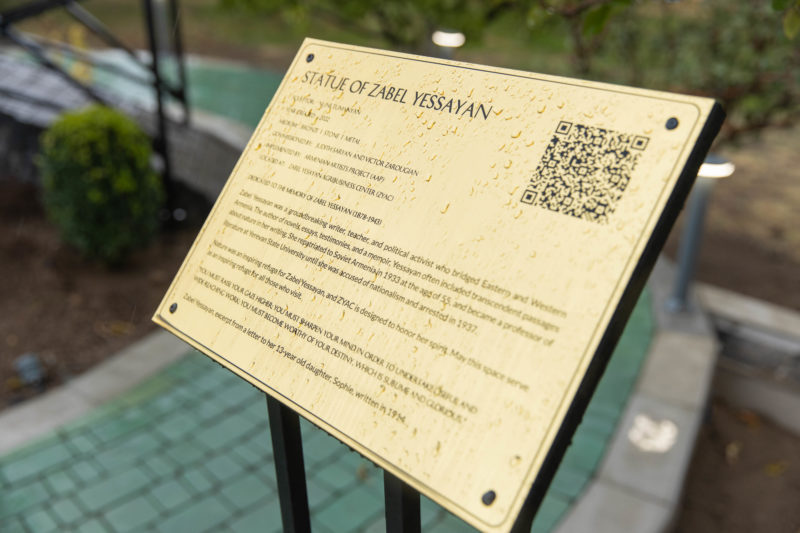
On his part, Grigoryan noted that changing the campus’s name made sense because although Yesayan was not directly connected to agriculture, she had a rebel spirit and the desire to change things, just as ICARE wants to do through its educational model. Not only was the ecofarm renamed ZYAC, but a statue of Yesayan, commissioned from Nune Tumanyan through a donation of Saryan and Zarougian, was erected on campus. As the center and campus was just in its initial state, Grigoryan said, “Zabel Yesayan is a sort of flagship to open doors for us and attract people to her statue and to the activities that we are doing here.”
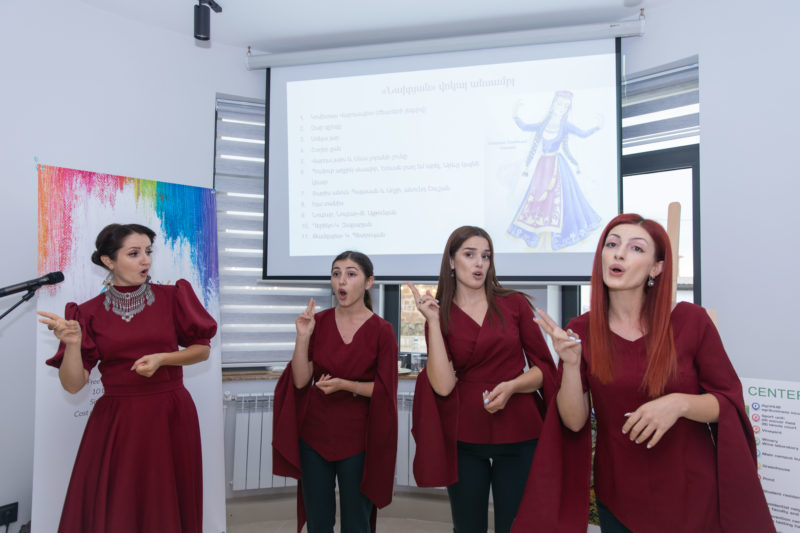
Decades prior to the campus project, and even before ICARE was founded, what became its flagship component, the Agribusiness Training Center (ATC), began in 2000 to provide undergraduate degree programs as a collaboration between Texas A&M University and ANAU. ICARE was founded five years later by these two universities and the United States Department of Agriculture’s Foreign Agricultural Service and began offering master’s degree programs in 2010. Today, ICARE’s ATC continues to offer degrees through ANAU, whose focus is degree education. Grigoryan specified that ICARE does not want to create another university or replicate ANAU (where he is a departmental dean).
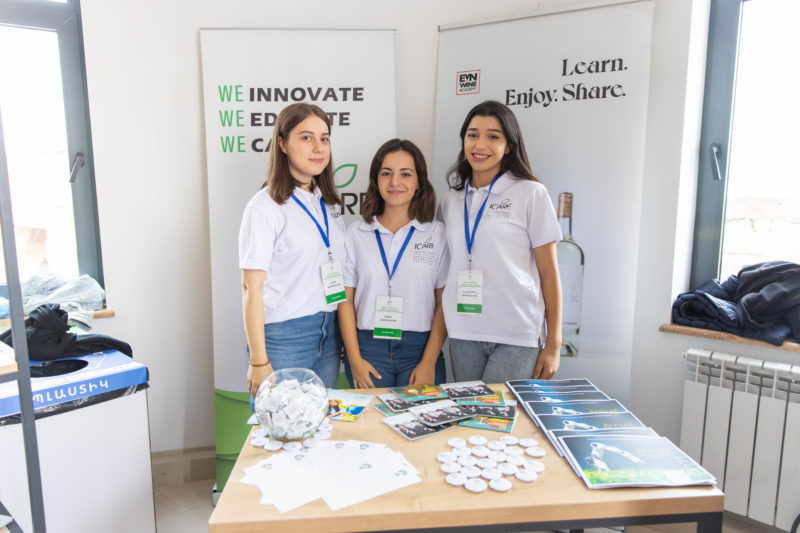
ICARE students
He said, “The ZYAC would be more or less a vocational educational center rather than providing a standard degree education. I say this because in many of our short-term programs, which we run with Geisenheim University of Germany, like the wine program and the greenhouse agronomy program, we see students come to us of very diverse ages, from 18 to 74…This is why we see ourselves as more of a center for lifelong learning and vocational education rather than a degree-granting university which mostly works with students in their 20s.”
A Business Oriented Approach
At present, Grigoryan said that there is only a four-story building built by the previous owner of the site, with some office space, but no real classroom space. The goal is not only to provide theoretical knowledge in the future classroom facilities. He said that in addition to centers where students can practice growing plants, producing wine and doing other practical activities, they participate and work in profit-making business units contained within the ICARE system. This would also contribute to the sustainability of the model via profits from the businesses.
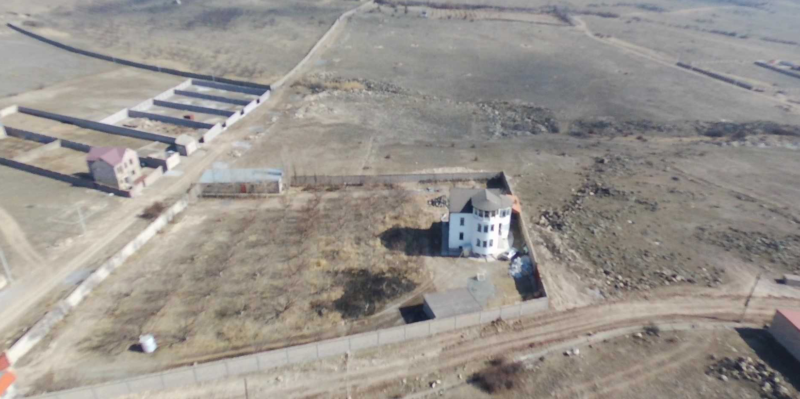
The land for ZYAC before development
He explained that he learned of this model for the campus while he was working for the American Farm School in Greece for several years, but the ICARE Foundation is trying to modify it and even bring it to a higher level. ICARE already had developed some experience with a business model of operation because as a non-governmental institution it had to financially support various enterprises originally created for educational purposes.
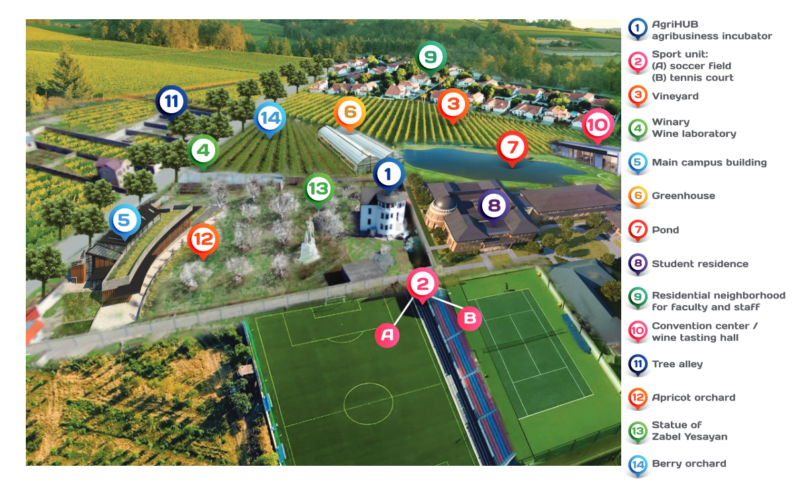
For example, there is the wine laboratory of the EVN Academy, a part of ICARE, which allows students to carry out chemical analysis of wines. To make it sustainable, it began to provide fee-based services to Armenian wineries. Grigoryan said, “Over the past five years, we expanded and started to provide wine testing services to almost every winery in Armenia, including the big ones, like Karas and Armenia Wine.” Although the latter have their own laboratories, they still would send samples for a second opinion. The wineries of Artsakh and many small wineries in Armenia send their samples. Now the lab makes profits and can sustain itself. Students learn as they help the staff conduct the fee-based services.
“We want to gradually expand this idea of having profit-making business units, which will insure that ICARE as an organization will not rely solely on donations. We are very thankful for all our donors but we really want to showcase that there are business opportunities in Armenia, and we also teach this to our students,” Grigoryan stated. A second opportunity soon appeared. EVN Academy began producing wine in the facilities of another winery and sales went quite well, Grigoryan said, with students helping both with production and marketing. Encouraged by this, a new winery is being established at ZYAC and the wine lab will eventually be moved from the Teryan Street offices to the new center too.
A vineyard is planned at ZYAC. Part of the produce will be used by the winery and the rest sold. The winery will allow experimentation with micro vinification and the creation of wines from new varieties of grapes, which eventually may be commercialized.
Eventually a greenhouse and other facilities will also be established at the ZYAC campus, which at present is about 13 acres in size but will hopefully grow to at least 30 acres. Grigoryan said, “What we want is to have a real mini-campus, like what exists in the United States but smaller, where students will have classroom space and business units, where they can actually work and participate in business activities. Hopefully there may be student residences in the future. There will be a full cycle of services provided to the students.”
There will be an agrihub, which is a USAID-funded project. This will be the first applied center for agribusiness startup, incubation and acceleration in Armenia, he said. It started because of many requests from students and graduates, who noticed the many parallel structures in the IT sector, but wanted similar ones for agriculture. For example, some asked for a plot of land to experiment with growing thyme, which largely has previously been harvested wild in Armenia.
“That is why we decided to establish the first platform in Armenia which will not only include classrooms, mentoring and training, but will also have physical facilities for those groups who can experiment and create prototypes, and try to commercialize those prototypes,” said Grigoryan.
There are already businesses resident in the ZYAC agrihub. One of them is run by Shahan Paloulian, a honey producer who is an ICARE program graduate. According to Grigoryan, he invited a new design of a beehive which can produce honey up to 5 to 10 percent more productively. He does not treat the bees with chemicals but uses essential oils.
Another startup, ArmenianKeg, is composed of two graduates who are producing kegs from various varieties of wood in Armenia for any drinks which need to be aged, and then selling them on different platforms like eBay. They needed office space and a showroom but because they just started they could not afford such space in Yerevan. The agrihub was a good solution for them.
There is also a group which wants to produce mushrooms.
Unlike the business units run by ZYAC, like the wine lab, vineyard and winery, these businesses are being allowed to come in, experiment and be accelerated for a certain period, perhaps around a year, before graduating out. In the future, a share of each new business, perhaps 10 percent, will be requested in exchange for this service, so that ICARE through this partnership can invest any profits into generating and incubating new businesses.
In addition to academic activities and business units, ICARE also engages in project implementation. It receives funding from international organizations such as the World Bank, the Food and Agriculture Organization of the UN (FAO), and USAID to carry out projects such as with fisheries or greenhouses, and most recently, an academic program in intensive fruit production financed by the Austrian Development Agency and based on industry demand. These projects can eventually lead to ICARE business applications.
“In general, our approach is that whenever we see that a project has a product or service which we can potentially continue with a potential to work at least at a breakeven point, then we do not stop when the project is over but continue offering it at a fee-based level. In this way we can continue to support the Armenian economy in that specific sector,” Grigoryan said.
Roadmap for Expansion
The cost to expand ZYAC over 30 acres and establish a main university building, student residences and various business units is estimated by Grigoryan to be up to 50 million dollars. At present, the ICARE core staff is up to 20 people, while there are around 150 people including short-term experts running the various academic programs and projects.
Local Armenian businesses are still a bit reluctant to invest in education, he states, though there are some exceptions. Instead, he said, “I think the two major sources will certainly be donations, and the profits generated by the business units within this campus such as the winery.”
He estimates that it will take some ten years to achieve the expansion. He said, “Every year we are adding a small bit to it. This is a continuous process. The school in Greece that I mentioned is now 120 years old and it continues development and adding business units.”
There are other components envisioned once the ZYAC model is fully operational. There is a lot of room for innovation and research in the sector of food production and food processing, Grigoryan said. Once sustainable funding has been created, then maybe a practical research laboratory can be created in this sector for experimentation.
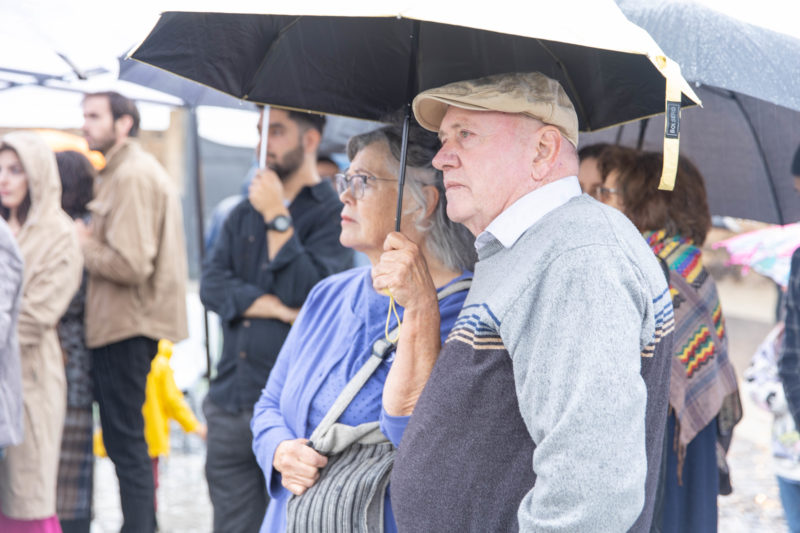
Grigoryan said that there are even more ambitious plans for expansion and the creation of new centers in different regions of Armenia and beyond. He declared, “We believe that in rural areas of Armenia there are many groups which want to start certain businesses but they need this platform in terms of office space and equipment so that they can start prototyping and experimenting with their products. In the longer term, we envision replicating this model, or at least the agrihub model, which is the agribusiness startup incubator, around Armenia – and maybe even going global at some point just like TUMO did. Time will tell.”
Withstanding Covid and Aggression
“Covid probably affected us more or less in the same way as it affected every other for-profit and non-profit institution in Armenia, because we had a lockdown. We had to switch some of our academic programs to online which presumed that we had to set up all the cameras and audio equipment in our classrooms,” Grigoryan said. In other words, the teacher would come to the classroom alone while all of the students would join online. Now this situation is better.
“In terms of war, and this continuous instability – because we don’t really feel in Armenia that it has ended, because it just goes on and on – I think we are all committed to make the Armenian economy stronger. We feel economic development is one of the important bases to support the army, to support our resilience, to support our ability for defense and this will also keep the Armenian people in Armenia. If they can earn a decent income in Armenia, then leaving Armenia, leaving for Europe, Russia or the United States, will be less attractive for them. So we need to create good income opportunities in Armenia,” Grigoryan commented.
He observed that Armenia is so small that everyone is practically on the frontiers. For example, once everyone thought that Jermuk was far from the war zone, but in September they realized it is on the frontier. From a personal point of view, he said, “Now I am sitting in my house and we are only 20 km. from the Turkish border. If we moved a bit north, we would be closer to the Azerbaijani border. We are all on the border line.”
The IT sector is encouraging more urbanization in competition with the agricultural sector, Grigoryan related, as everyone wants to move to Yerevan and do programming or coding, sitting in cafes. On the other hand, ICARE believes that modern, productive and innovative agriculture can create economic opportunities in rural Armenia and in particular in border area villages.
Grigoryan said that ICARE didn’t want to separate itself from the IT sector, as many of ICARE’s current students and graduates come from that very field. They earned some wealth there but want to invest money in the agricultural sector. For example, many of the EVN wine program graduates continue their IT companies while investing in wineries or intensive fruit orchards.
Consequently, Grigoryan said that ICARE can potentially be a bridge between the successful IT sector and a successful agricultural sector. This will bring more development to rural Armenia and connect the latter with capital. In Armenia, this wealth is concentrated in Yerevan at present.
ICARE participates in big strategic planning workshops and events. For example, Grigoryan participated in the Global Armenia Summit organized by the Armenian government at the end of this October. He said, “We want to listen and to share our own ideas. We don’t want to develop in our little cage. We are part of the bigger organism which is Armenia and its diaspora.”
Most importantly, he said, “What we as an organization would like to see more clearly is a big vision and big strategy, not only at the vision level and philosophy, but also step-to-step. How would we see Armenia in 10 or 20 years, and how would others see ICARE’s contribution?
